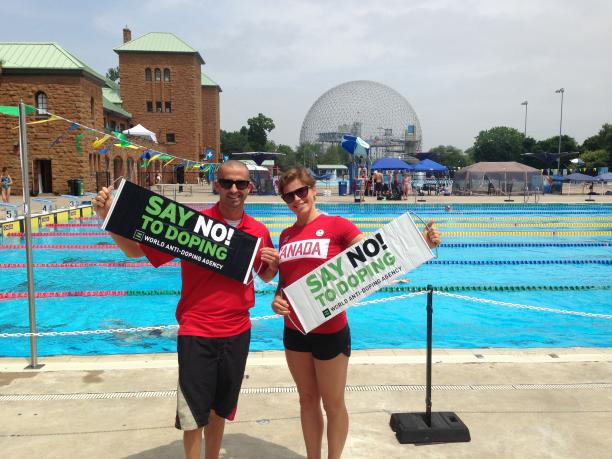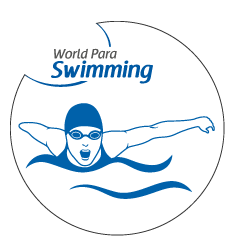No. 25: IPC and WADA team up for fair play
07.12.2013The 2013 IPC Swimming World Championships saw an innovative partnership which became the model for IPC anti-doping efforts.
 Canadian swimmers Benoit Huot and Valerie Grand Maison show their support for the IPC and WADA anti-doping day taking place on 13 August, 2013.
© • Swimming Canada
Canadian swimmers Benoit Huot and Valerie Grand Maison show their support for the IPC and WADA anti-doping day taking place on 13 August, 2013.
© • Swimming Canada
- Related News
- WADA approves 2015 World Anti-Doping Code
- Powerlifters spread 'Raise the Bar' message
- IPC Powerlifting reveals plans to tackle doping
- IPC and WADA join forces to promote clean sport
- CIP et le L’AMA unissent leurs forces pour promouvoir le sport propre
- Related Features
- No. 29: Young women target greatness in shooting
- No. 28: Newcomer Guus Bijlard’s shocking sailing title
- No. 27: Rob Davies vaults to table tennis world No. 1
- No. 26: Russian sitting volleyball squad surprises
“The day proved to be a great example of how launching educational initiatives at sporting events can help raise awareness and garner the support we need to ensure clean sport."
The importance of anti-doping in para-sport was given new life in August, at the 2013 IPC Swimming World Championships in Montreal, Canada.
IPC Swimming, the global governing body of the sport, led the way in rolling out new methods of reaching athletes and teams and striking right at their heart of their shop window – major competition.
An education booth was set up where people could learn more about anti-doping and athletes were given branded swimming caps, teams and officials were given green t-shirts, temporary tattoos and spectators were given banners. The day was dubbed ‘Say No! to Doping’.
“It is highly effective and really important to take education and awareness about doping to the teams during events like this. If we don’t do this, we are missing out on a massive captive audience and therefore a huge opportunity”, Peter Van de Vliet, the IPC’s Medical and Scientific Director said.
The entire day involved all aspects of IPC Swimming, from sport management to the media team, from marketing to officials. Crucially it placed athletes front and centre to speak out and set a good example.
This was in its entirety a unique concept that had never been tried before. And it worked.
Over 100 people visited a dedicated outreach booth during the day, taking part in a quiz or speaking to anti-doping experts who were on hand to answer questions and give advice in confidence.
Prolific swimmers also put their name to the event ahead of the competition, taking part in social media activity, a press conference and acting as role models for younger swimmers. These included Paralympians Jessica Long, 18-time American World Champion, multiple Brazilian World champion Andre Brasil and World Champion Benoit Huot, one of Canada’s most successful swimmers ever.
“The Athlete Outreach Program’s Say NO! to Doping initiative that WADA launched with IPC Swimming at the 2013 World Championships was a huge success. The initiative was about so much more than sporting the green colours, staging a press conference and setting up an education booth; it was above all about athletes demonstrating the right attitude towards clean sport”, WADA Director General David Howman said.
“We saw this healthy attitude in abundance from all the competitors who were in Montreal that day.”
Further weight was given to the concept and partnership by a joint press conference attended by Howman and IPC President Sir Phillip Craven. They were joined by athletes who were willing to speak openly and honestly about anti-doping.
“The day proved to be a great example of how launching educational initiatives at sporting events can help raise awareness and garner the support we need to ensure clean sport. WADA was delighted to be able to partner with the IPC to do this so successfully”, Howman said.
The model is one which is now being rolled out across other sports, including IPC Powerlifting.
Powerlifting in particular has launched an entire campaign based around the concept of reaching out to athletes when they are most receptive to advice: ‘Raise the Bar – Say No! to Doping’. A series of educational talks have already taken place andare lined up for upcoming competitions, climaxing at the 2014 IPC Powerlifting World Championships in Dubai, UAE in April.
Here athletes and teams are being offered the opportunity to take part in seminars led by leading anti-doing experts, as well as show their support for anti-doping by having their pictures taken for IPC Powerlifting’s Facebook and Twitter pages, spreading the message far and wide.
For Vanessa Webb, the IPC’s Anti-Doping Senior Manager, the model is working:
“We have now seen how effective education and awareness programmes like this can be across a number of different sports and competitions, including at the 2013 IPC Athletics World Championships in Lyon, France where education booths were piloted.
“It is important that we keep the momentum going into the future and find every opportunity to target athletes and teams in this way.”





















